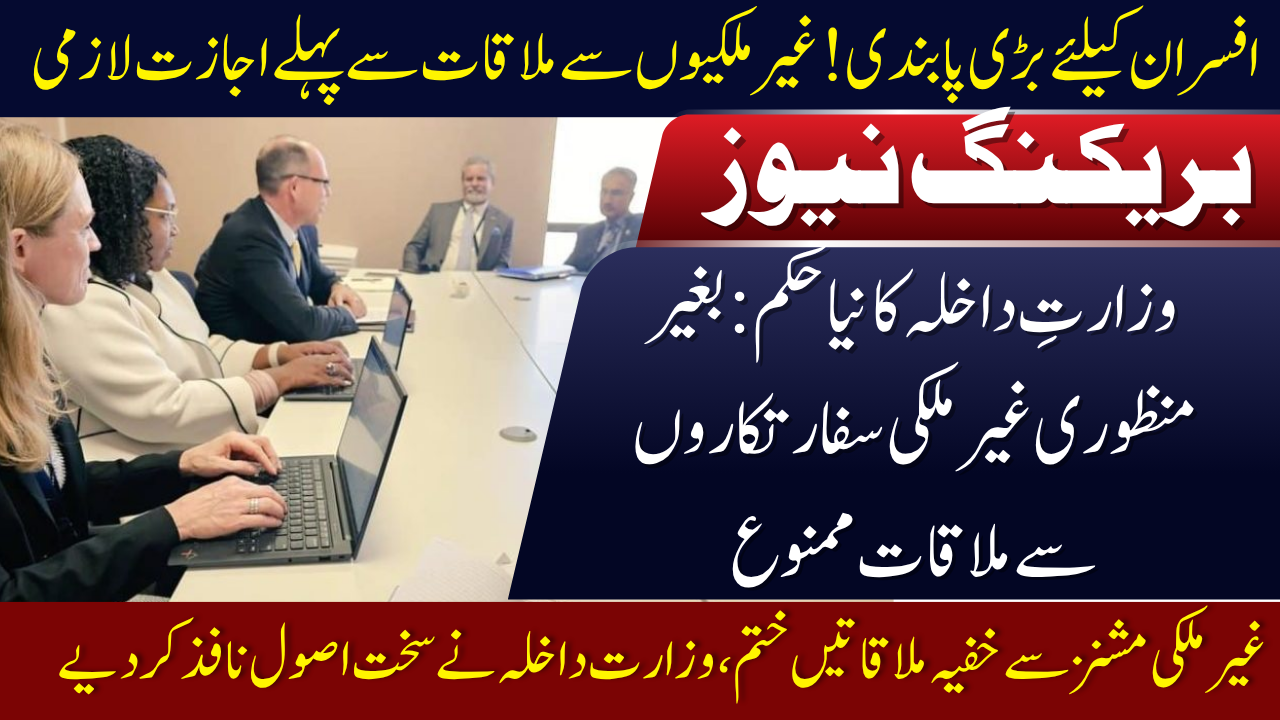Prior Approval for Officers Meetings
The Government of Pakistan has introduced new rules under the Interior Ministry requiring government officers to obtain prior approval before holding meetings with foreign nationals or foreign missions. The policy aims to ensure better coordination, protect national interests, and maintain diplomatic propriety. Many ministries and departments are now being reminded to follow strict channels and protocols when interacting with foreign individuals or entities.
What the New Directive Covers
- All officers, especially those in grades below Secretary / Additional Secretary, must seek formal approval before meeting foreign diplomats, mission members, or foreign officials for any “official or semi-official” matter.
- The Ministry of Foreign Affairs and relevant supervising authorities are to be informed of such meetings in advance. In some cases, the Interior Ministry or Foreign Affairs Division might demand summaries or justifications for the intended meeting.
- Any direct approach to embassies or foreign missions for favors, arrangements, or representations is to be routed through official protocol channels only, not via personal contact or informal invitations.
- Departments are being directed to issue internal ordinances that ensure compliance, and violations may be treated as misconduct under respective service rules.
Why This Move is Being Made
This directive reflects growing concerns over:
- Diplomatic protocol breaches where individual officers bypass proper channels and communicate with foreign missions without oversight.
- Security and transparency — unauthorized meetings may carry risk of leaks, misunderstandings, or misuse of influence.
- Maintaining Pakistan’s international standing — informal contacts with foreign missions, especially for favors or informal engagements, have sometimes led to embarrassment or claims of impropriety.
- Institutional discipline — ensuring that interactions follow established rules helps maintain order and accountability in government operations.
Context & Past Precedents
While the new directive has been more explicitly emphasized recently, there are several prior instances and rules that touch on similar domains:
- A letter from the Cabinet Division discouraged government servants from directly approaching foreign missions without going through the Ministry of Foreign Affairs, citing Government Servants (Conduct) Rules and Rules of Business. Business Recorder
- The Establishment Division’s rules also address NOCs (No Objection Certificates) and proper channels for foreign interactions. Commerce Ministry Pakistan+1
- Previous foreign travel policies required details to be submitted to the Foreign Ministry, and in many cases, approval from higher authorities like the Prime Minister for official visits or meetings. SAMAA TV+1

Implications for Government Officers and Departments
| Area | What Changes for Officers / Departments |
|---|---|
| Meeting Planning | Must obtain formal NOC or approval before meeting foreign nationals or missions. |
| Communication Protocols | All requests must go through Ministry of Foreign Affairs or Interior as per channel. No direct informal contact. |
| Documentation | Officers may need to submit meeting requests, agendas, purpose, participants in advance. |
| Accountability | Non-compliance may lead to disciplinary action under government service rules. |
| Processing Time | Meetings may be delayed due to bureaucratic approval steps. |
What Officers Should Do Now
To comply and avoid issues, government officers should:
- Check their department’s internal rules to see how this directive is being implemented locally.
- Submit meeting requests early, giving enough time for approvals. Include the purpose, participants, and background.
- Engage with the Foreign Affairs Division or relevant protocol offices as needed.
- Avoid informal or social meetings with foreign mission officials unless properly approved and documented.
- Keep records of approvals (emails, memos) to show compliance, especially in case of audits or inquiries.
Potential Challenges and Criticism
- Delays and bureaucracy may hamper departmental operations, especially for urgent or field-level interactions.
- Over-control vs flexibility: Some officers may feel this stifles their ability to perform efficient diplomacy or networking.
- Interpretation ambiguities: What counts as an “official meeting” vs casual contact may cause confusion.
- Resource constraints: Some departments may lack protocol or foreign affairs specialists to process approvals swiftly.
Final Thoughts
The new mandate by the Interior Ministry for officers to secure prior approval before meeting with foreign nationals represents Pakistan’s effort to tighten control, preserve diplomatic integrity, and minimize risks. While it emphasizes discipline and accountability, its effectiveness will depend heavily on how smoothly the approval mechanism works and how fairly it’s enforced.
Related Posts













